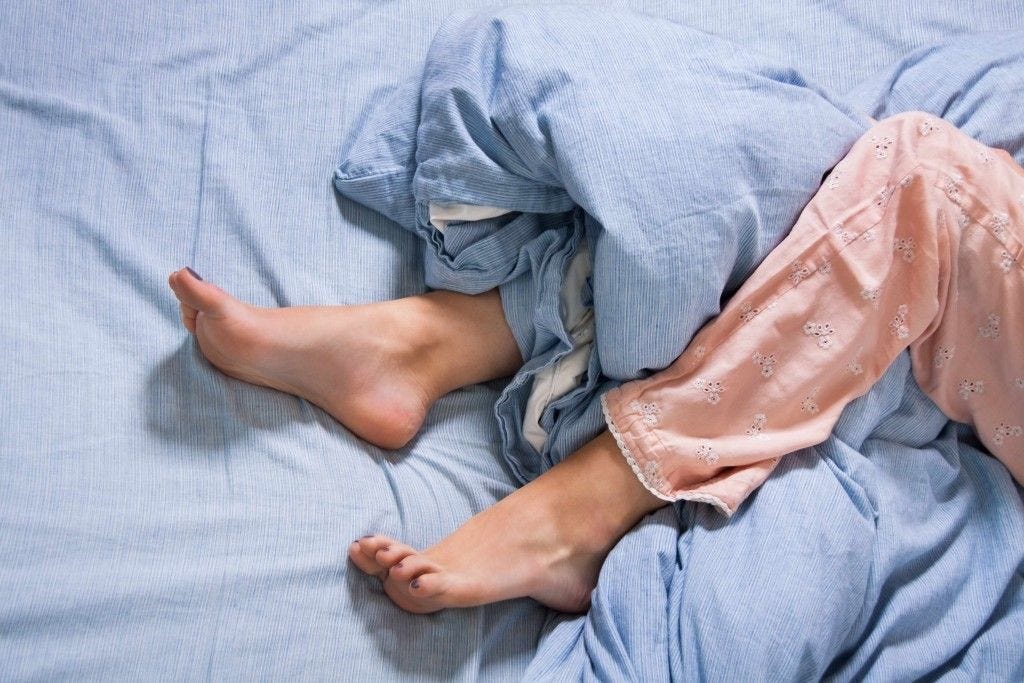🦵💆♀️💤 Managing Restless Leg Syndrome
RLS is a common condition that affects a significant portion of the population.
👋 Welcome to ADAWell, the newsletter dedicated to exploring health issues that matter to modern individuals. Today, we focus on Restless Legs Syndrome (RLS) 🦵, a neurological disorder characterized by an irresistible urge to move the legs, often accompanied by uncomfortable sensations in the legs. These sensations are often described as creeping, crawling, tingling, or burning 🔥, and they typically occur when the person is at rest or trying to sleep 😴. RLS can cause significant sleep disturbance and daytime fatigue 😴💤, and it can have a negative impact on a person's quality of life.
Primary RLS and secondary RLS1
The exact cause of RLS is still unknown, but it is believed to be related to dysfunction in the brain's dopamine system and iron metabolism. In some cases, RLS may be hereditary, and certain medical conditions such as iron deficiency, pregnancy, chronic renal failure, and neurological disorders can also trigger or worsen RLS symptoms. More research is needed to fully understand the underlying causes of RLS.
Primary RLS is considered to be idiopathic when the cause is truly unknown, and it is believed to be related to dysfunction in the brain's dopamine system and iron metabolism. 🧠💊
Secondary RLS is associated with a variety of neurological disorders, iron deficiency, pregnancy, or chronic renal failure. 🤰🩸💉
Some correlated factors of RLS include: diabetic peripheral neuropathy 🩸💉, painful neuropathies 🤕, and ADHD 💭.
RLS can cause you to experience the following:2
Changes in mood
Exhaustion and daytime sleepiness
Problems concentrating
Impaired memory
Decreased productivity
Depression and anxiety
The study found that the prevalence of RLS was higher in adults with ADHD compared to the general population.
Various underlying medical conditions are associated with RLS, including cardiovascular disease ❤️, coronary artery disease 💓, heart problems 💔, obesity 🍔, diabetes 🩸, chronic pain 🤕, arthritis 🦴, neuropathy 🧠, and uremia 🩸💀.3
ADHD
In clinical samples, up to 44% of subjects with ADHD have been found to have RLS or RLS symptoms, and up to 26% of subjects with RLS have been found to have ADHD or ADHD symptoms. Several mechanisms may explain this association. Sleep disruption associated with RLS might lead to inattentiveness, moodiness, and paradoxical overactivity. Diurnal manifestations of RLS, such as restlessness and inattention, might mimic ADHD symptoms. Alternatively, RLS might be comorbid with idiopathic ADHD. Subjects with RLS and a subset of subjects with ADHD might share a common dopamine dysfunction. Limited evidence suggests that some dopaminergic agents, such as levodopa/carbidopa, pergolide, and ropinirole, may be effective in children with RLS associated with ADHD symptoms.4
Treatment
It may involve a combination of medication, lifestyle changes, and other therapies, and it should be tailored to the individual patient's needs and medical history.
RLS can be diagnosed and treated by healthcare professionals such as neurologists, sleep specialists, and primary care physicians. 🩺💤💼
It depends on the severity of the symptoms and the underlying cause. In some cases, lifestyle changes such as regular exercise, avoiding caffeine and alcohol, and establishing a regular sleep routine can help alleviate symptoms. For mild to moderate cases, medications such as dopamine agonists, iron supplements, and anticonvulsants may be prescribed. It is important to consult with a healthcare professional for proper diagnosis and treatment of RLS.
The following lifestyle changes and activities may provide some relief if you have mild to moderate RLS:5
Avoid or decrease the use of alcohol, nicotine, and caffeine
Change or maintain a regular sleep pattern
Try moderate, regular exercise
Massage the legs or take a warm bath
Apply a heating pad or ice pack
Use foot wraps specially designed for people with RLS, or vibration pads to the back of the legs
Do aerobic and leg-stretching exercises of moderate intensity
https://www.ncbi.nlm.nih.gov/pmc/articles/PMC5454050/
https://www.ninds.nih.gov/health-information/disorders/restless-legs-syndrome#toc-what-is-restless-legs-syndrome-
https://www.sciencedirect.com/science/article/abs/pii/S1087079211000578
https://pubmed.ncbi.nlm.nih.gov/16218085/
https://www.ninds.nih.gov/health-information/disorders/restless-legs-syndrome#toc-what-is-restless-legs-syndrome-
👋 If you would like more research and series on this topic, please let me know in the comments below! I am always open to hearing your feedback and suggestions for future content.

